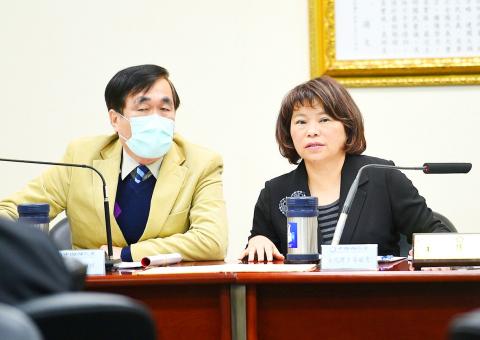Chinese Nationalist Party (KMT) Acting Chairperson Huang Min-hui (黃敏惠) yesterday joined the list of candidates for party chairperson, while former Taipei mayor Hau Lung-bin (郝龍斌) announced he would stay out of the race.
Taipei City Councilor Lee Hsin (李新) on Tuesday picked up a registration form for the by-election and Deputy Legislative Speaker Hung Hsiu-chu (洪秀柱) did yesterday.
Huang, 57, is a former party vice chairperson and former Chiayi mayor.

Photo: Chang Chia-ming, Taipei Times
Huang reportedly called Legislative Speaker Wang Jin-pyng (王金平) before she sent an aide to pick up the form, informing Wang of her decision and assuring him that the party’s local faction would not be absent from the race.
Soochow University political science professor and New Power Party legislator-at-large-elect Hsu Yung-ming (徐永明) on Saturday last week said that a mainlander-origin (外省籍) chairperson election would “New-Party-ize” the KMT.
Wang, who is widely seen as the leader of the party’s local faction — as opposed to people of mainlander origin— said before the Jan. 16 elections that he would not run for party chairperson.
Vice President Wu Den-yih (吳敦義) had been considered a possible candidate who could win the support of local faction members.
However, reports say he is hesitant to join the race with Hung announcing her bid because he stands little chance given that the party’s Huang Fu-hsing military veterans’ branch — traditionally a ‘deep-blue’ faction that harbours deep distrust of Wang after the political feud between Wang and President Ma Ying-jeou (馬英九) in 2013 — constitutes a key base of the party membership.
Hau yesterday released a statement that said he would not join the chairperson election, undoing reports that he would go to party headquarters to pick up a form at 3:30pm.
“I have seen many of our comrades revealing their interest in joining the party chairmanship election. It is unprecedented for the party. These [candidates] have different backgrounds, are of different generations and equipped with various life experiences, a phenomenon that demonstrates the KMT’s diversity and tolerance” of differences, Hau said in the statement.
“With this wide variety of representation, I believe that party members and the public have a sufficient array of choices, from which the most fitting party line and party chairperson could be chosen,” he said, adding that he would help party members build a better KMT.
Legislator Apollo Chen (陳學聖), who was re-elected on Jan. 16, picked up a registration form yesterday.
As the only lawmaker among the contenders, the party could best perform its role as supervisor of the government as an opposition party with him as chairperson, Chen said.
Chen said the KMT should start to accustom itself with intra-party democracy.
“A race with multiple contenders is not a sign of disintegration, but a process toward achieving consensus and a rebirth of the KMT,” he said.
Taipei City Councilor Chung Hsiao-ping (鍾小平), tried to collect a form, but was denied because qualification rules require candidates to have been a KMT Central Committee member.

A preclearance service to facilitate entry for people traveling to select airports in Japan would be available from Thursday next week to Feb. 25 at Taiwan Taoyuan International Airport, Taoyuan International Airport Corp (TIAC) said on Tuesday. The service was first made available to Taiwanese travelers throughout the winter vacation of 2024 and during the Lunar New Year holiday. In addition to flights to the Japanese cities of Hakodate, Asahikawa, Akita, Sendai, Niigata, Okayama, Takamatsu, Kumamoto and Kagoshima, the service would be available to travelers to Kobe and Oita. The service can be accessed by passengers of 15 flight routes operated by

GIVE AND TAKE: Blood demand continues to rise each year, while fewer young donors are available due to the nation’s falling birthrate, a doctor said Blood donors can redeem points earned from donations to obtain limited edition Formosan black bear travel mugs, the Kaohsiung Blood Center said yesterday, as it announced a goal of stocking 20,000 units of blood prior to the Lunar New Year. The last month of the lunar year is National Blood Donation Month, when local centers seek to stockpile blood for use during the Lunar New Year holiday. The blood demand in southern Taiwan — including Tainan and Kaohsiung, as well as Chiayi, Pingtung, Penghu and Taitung counties — is about 2,000 units per day, the center said. The donation campaign aims to boost

MORE FALL: An investigation into one of Xi’s key cronies, part of a broader ‘anti-corruption’ drive, indicates that he might have a deep distrust in the military, an expert said China’s latest military purge underscores systemic risks in its shift from collective leadership to sole rule under Chinese President Xi Jinping (習近平), and could disrupt its chain of command and military capabilities, a national security official said yesterday. If decisionmaking within the Chinese Communist Party has become “irrational” under one-man rule, the Taiwan Strait and the regional situation must be approached with extreme caution, given unforeseen risks, they added. The anonymous official made the remarks as China’s Central Military Commission Vice Chairman Zhang Youxia (張又俠) and Joint Staff Department Chief of Staff Liu Zhenli (劉振立) were reportedly being investigated for suspected “serious

ENHANCING EFFICIENCY: The apron can accommodate 16 airplanes overnight at Taoyuan airport while work on the third runway continues, the transport minister said A new temporary overnight parking apron at Taiwan Taoyuan International Airport is to start operating on Friday next week to boost operational efficiency while the third runway is being constructed, the Ministry of Transportation and Communications said yesterday. The apron — one of the crucial projects in the construction of the third runway — can accommodate 16 aircraft overnight at the nation’s largest international airport, Minister of Transportation and Communications Chen Shih-kai (陳世凱) told reporters while inspecting the new facility yesterday morning. Aside from providing the airport operator with greater flexibility in aircraft parking during the third runway construction,